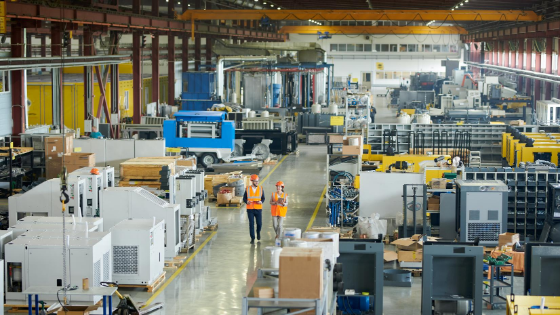While not inherently unsafe, the manufacturing industry is one of the leaders of workplace accident and injury.
The use of tools, equipment, and procedures in a factory setting to process raw materials into secondary components simply has more opportunities for risk than working in an office environment, for example.
Workplace safety in a factory setting is so crucial. Not only does it preserve the health and safety of workers, but it keeps worksites themselves from productivity slowdowns. Maintaining a strong safety culture and a positive work safety environment is therefore important to both employees and managers alike.
Here are some factory safety tips to keep manufacturing sites safer and incident-free.
Wear Proper Safety Equipment
Personal protective equipment (PPE) is a must-have for just about any manufacturing job. Whether it’s ear protection, eye protection, hard hats, respirators, or anything else, always ensure workers are equipped with the proper PPE and that they’re wearing it appropriately. Doing so helps prevent accidents or injuries that could otherwise be debilitating.
Prevent Slips, Trips and Falls
Work areas with cluttered, dirty, or slippery floors and surfaces are a serious danger when it comes to tripping and falling. Falls from height can be especially dangerous, so ensure workers on scaffolding are using safety harnesses and that stairwells are clean and dry at all times. Read more about preventing slips, trips and falls.
Lift Heavy Loads Safely
Factory workers often need to lift heavy loads, such as while receiving or preparing shipments. Encourage employees to always lift with their legs to avoid back injury, to use proper tools such as hand trucks or forklifts, and to get help to lift very heavy or cumbersome loads.
Practice Forklift Safety
If your worksite uses forklifts or other heavy machinery, ensure that workers are trained and certified in their proper use. Machinery thoroughfares should remain clear at all times and the vehicles themselves need to be maintained regularly to avoid mechanical problems that could lead to an accident. Learn more about the benefits of forklift safety training.
Use All Tools and Equipment Properly
Ensure that all the tools and equipment your employees are working with have been cleaned and maintained regularly. Furthermore, workers need to be trained in the proper use of these tools and equipment, which includes emergency shutdown procedures in the event of mechanical failure or similar incident.
Report Unsafe Conditions Immediately
Create a culture where it’s customary and encouraged to report unsafe conditions, or situations that could quickly become unsafe, immediately. Workers can rectify safety issues themselves if they have the time or resources, but if this is impossible it’s crucial to inform management so that the situation can be addressed as quickly as possible before an injury can occur.
The Last Word on Factory Safety
Just because a factory environment poses more safety risks than other types of jobs doesn’t mean that it needs to be a more dangerous place to work. Whether you’re an employee or a manager, you can keep the above factory safety tips in mind to provide a safer, more comfortable, and even more productive work environment.
